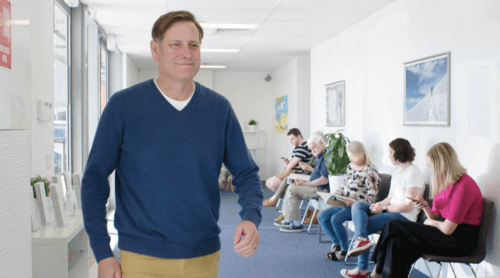
Optimising Brain Health
What is Brain Health ?
The World Health Organisation describes brain health as “an emerging and growing concept that encompasses neural development, plasticity, functioning, and recovery across the life course. Good brain health is a state in which every individual can realise their own abilities and optimise their cognitive, emotional, psychological and behavioural functioning to cope with life situations. Brain health conditions emerge throughout the life course and are characterised by disruptions in normal brain growth and/or brain functioning. Health and social care for these conditions require multisectoral and interdisciplinary collaborations with a holistic person-centred approach focused on promotion, prevention, treatment, care and rehabilitation over the lifespan and the active engagement of persons experiencing the conditions and their families and carers, as appropriate.”
Why is Brain Health important ?
Experts agree that whatever your age it’s important to take steps to keep your brain in good shape. The good news is that relatively simple changes to lifestyle can make a big difference to brain health in the long-term. Research indicates that whatever your age you can benefit from taking simple steps to improve your brain health. It is never too early, or too late, to look after your brain!
The Top 5 Brain Health Factors
Research suggests that there are 5 Top Factors that affect brain health. Studies indicate that it is important to address as many factors as possible to optimise your brain health and keep your brain working as best as possible.
Physical Exercise
Research shows that “brain health equals heart health”. In other words, improving your physical health is one of the best things you can do to look after your brain.
It is recommended that children should do at least 1 hour of moderate to vigorous intensity physical activity every day, which should include a variety of aerobic activities. It is also recommended that children should do some type of physical activities that strengthen their muscles at least 3 days per week.
Adults should also limit the amount of time sitting, and doing any exercise is better than none. If you are currently not doing any exercise at all then gradually build up over time. Try to be active every day and aim to build up to between 2.5 to 5 hours of moderate exercise or about half that amount of vigorous exercise each week. It is also important that adults do muscle strengthening activities on at least 2 days each week. Remember that if you have not done much exercise for a while to seek advice from your doctor about safe ways to start.
Stress Management
It is well known that long-term stress can have a significant impact on physical and mental health. Studies show that prolonged stress can impact children's learning and can increase the risk of problems later in life such as Alzheimer’s Disease, Anxiety and Depression. Long-term stress has even been shown to shrink the brain.
It is very important for everyone to take steps to manage stress. The good news is that there are lots of different ways to do this. Different activities work for different people and examples include listening to music, meditation, physical exercise, relaxing with a good book, enjoying time with friends or family and spending time outdoors in nature.
Sleep
Sleep is essential for ensuring optimum physical health and mental well-being. Insufficient sleep affects cognitive functions including attention, decision-making, working memory, problem-solving and emotional control. Research has also shown that insufficient sleep can cause inflammation in the brain, reduce the growth of new brain cells and increase the risk of ADHD, Alzheimer’s Disease, Anxiety, Chronic Pain, Depression and Migraine Headaches.
The secret to a restful and refreshing night sleep is to develop good sleep habits: Avoid coffee and other caffeinated drinks after lunchtime; Spend some time in the evening relaxing before you get into bed and avoid bright lights, especially the “blue” light from television or electronic devices; Aim to get into bed at the same time each night; Ensure your bedroom is cool, dark, quiet and free from distractions such as television or electronic devices; Consider reading a book or practicing a little meditation to help you “switch off”; Finally remember to get the right amount of sleep - On average young school-age children need about 9-11 hours per night, reducing to about 8-10 hours per night for teenagers. Adults need a little less with about 7-9 hours sleep each night being ideal.
Diet
There is overwhelming evidence that the modern ‘Western-Style Diet’ which is high in processed foods, sugar and saturated fats, damages our body and brain. The good news is that research shows that ‘The Mediterranean-Style Diet’ can protect your body and brain. ‘The Mediterranean-Style Diet’ is rich in fruits, vegetables, nuts, whole grains, olive oil and lean sources of animal protein. The diet is low in red meat and other saturated fats, and contains few processed foods or refined sugars. ‘The Mediterranean-Style Diet’ includes a little alcohol in moderation (traditionally wine with meals) and encourages sitting down to eat together as a family. There is also good evidence that The MIND Diet (which also emphasises leafy greens and berries) is particularly helpful in protecting brain health.
Mental Activity
Research shows that people who engage in regular mental activity have better attention and memory, are happier, have less age-related cognitive decline, and in some cases can even manage to “wind back the clock”. Whilst it is not clear if one type of mental activity is best, there are 3 Important Rules:
Sustained Focussed Attention - You obviously need to put in some effort. If the activity does not command your sustained focussed attention then your brain is not doing much work !
Challenge - It is important that the activity should be challenging. This means that once something becomes easy it’s time to find something else to do.
Timing - The good news is that it doesn’t seem to matter how old you are. Everyone can engage in mentally stimulating activities at any age and still benefit.















